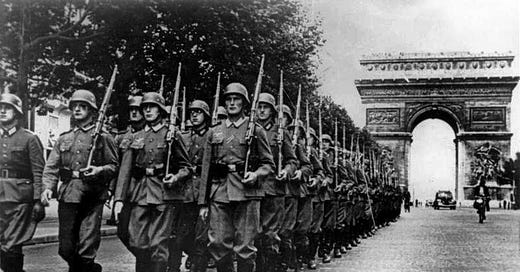Paris falls: An 'incomprehensible' scene
C. Brooks Peters was in Berlin when Paris fell to the Germans on June 14, 1940, but the opening paragraph of his New York Times story drove home the grim new reality facing the free world as well as anything written that day.
Today, for the third time within the last century and a quarter, victorious German troops marched into Paris. This time, however, the legions, the clatter of whose hobnailed boots resounds throughout Paris and the entire world, are more than just German soldiers. They are the bearers of a proposed new world order for Europe and perhaps the rest of the world, a major tenet of which is to destroy the old one.
Even after all that had occurred in nine months of war, the fall of Paris was a devastating symbolic blow, at the very least. Given the cachet as a literary haven the French capital had enjoyed between the wars, it was no surprise that grief poured forth from typewriters around the world at news of its loss.
A Boston Globe editorial printed June 15 went on at length in this vein:
Disaster must choose mid-June as the season to fall upon the world’s most beautiful city, mid-June when it is at its most beautiful; and strange it is to picture the flowering paths, the cool shade, the gleaming statues and tinkling fountains of the Champs-Elysees when (as Charles Gounod wrote in his “Gallia” after the last German seizure of Paris, in 1870),
Solitary lieth the city, she that was full of people.
How is she widowed, she that was great among nations.As those of her citizens who refused to leave sit stunned and dumb behind closed shutters, how sleep her illustrious dead in the crypt of the Pantheon, and how will it fare with the books and papyri of the Bibliotheque Nationale which ahve taken centuries to recover from the wreck of the ancient world and to restore to intelligibility, how with the treasures of the Louvre and the Luxembourg, how with teh stained glass of the Sainte Chapelle, how with the rich and vast Elysian fields which have drawn to Paris from all over this globe the artist, the musician, the scholar, the man of letters, the antiquarian, the scientist, the biblophile, the connoisseur of living as a fine art?
Though anyone who had lived in or visited or read about or dreamed of Paris before the fall surely felt a swell of emotion, the journalists on the ground focused more on the immediate human impact.
Virginia Cowles, 29-year-old American correspondent for the Sunday Times, would write about the harrowing journey south toward the temporary seat of government at Tours.
In that world of terror, panic and confusion, it was difficult to believe that these were the citizens of Paris, citizens whose forefathers had fought for their freedom like tigers and stormed the Bastille with their bare hands. For the first time, I began to understand what had happened to France. Morale was a question of faith; faith in your cause, faith in your goal, but above all else, faith in your leaders. How could these people have faith in leaders who had abandoned them?
New York Times correspondent Harold Denny got a similar vibe after flying from London to Tours on June 13.
“It is a terrible thing to see a great people in disintegration,” he wrote in a story for the June 15 Times. “It is like watching the end of the world.”
That apocalyptic feel came through in a dispatch from the venerable Chicago Daily News correspondent Robert J. Casey, who had decamped from the capital two days earlier. The conclusion of his final dispatch from the city read this way:
So once more, one went to bed and spent an evening listening to the guns and the hum of airplane motors and sensing the smoke of distant artillery in the sky of the morning. There seemed no reason why one might not stay on here in this quiet, peaceful city forever. Then the hotel closed. Suddenly somebody shut down the remaining cable.
You took a last look at the sun on the domes of Sacre Coeur and, willy-nilly, you packed your bags. It wasn’t much like Paris as you drove out toward the Porte St. Cloud — yawning streets and shuggered shops and vacant terraces. And yet it was entirely like Paris.
That ghost-town atmosphere still prevailed when longtime Associated Press Berlin bureau chief Louis P. Lochner gave readers around the world the first glimpse of life in occupied Paris after arriving late on the 14th.
Based in Berlin since 1924, Lochner had accompanied German troops across France, and his story began with a vision of swastika banners flying “from atop practically every prominent and historic structure in this German-captured capital of France.”
But more than that astonishing sight, it was the utter lack of life in the normally vibrant city that left Lochner dumbfounded.
“To countless American tourists who know Paris it is probably as incomprehensible as it was to me that the old Paris was a ghost city when I entered,” he wrote.
Along the Champs-Elysees only one cafe was open — all else was deadly silent.
Other avenues radiating from the Place de la Concorde, which normally are crowded with people sipping their apertifs, were dead.
At the busy Place de L’Opera I counted 11 persons, two of them policemen.
Lochner did note with satisfaction that he saw no visible damage among the city’s numerous major landmarks, but the capital’s life was gone — and would be for more than four years.




